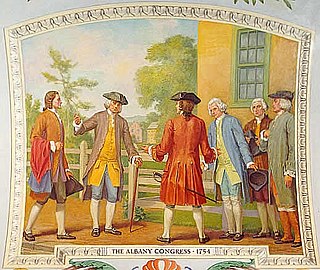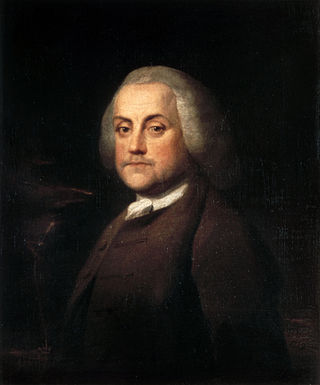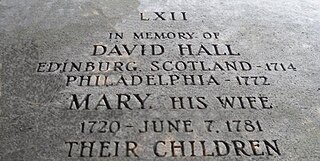Related Research Articles

The American Revolution was an ideological and political revolution that occurred in British America between 1765 and 1791. The Thirteen Colonies gained independence from Great Britain in the American Revolutionary War (1775–1783), gaining independence from the British Crown and establishing the United States as the first nation-state founded on Enlightenment principles of constitutionalism and liberal democracy.

Benjamin Franklin was an American polymath who was active as a writer, scientist, inventor, statesman, diplomat, printer, publisher, and political philosopher. Among the leading intellectuals of his time, Franklin was one of the Founding Fathers of the United States, a drafter and signer of the Declaration of Independence, and the first Postmaster General.

The Thirteen Colonies, also known as the Thirteen British Colonies, or the Thirteen American Colonies, were a group of British colonies on the Atlantic coast of North America. Founded in the 17th and 18th centuries, the American Enlightenment led these colonies to revolution, and declaring full independence in July 1776, which was achieved in 1783 with the Continental Army's victory over the British in the American Revolutionary War.

The Albany Congress, also known as the Albany Convention of 1754, was a meeting of representatives sent by the legislatures of seven of the British colonies in British America: Connecticut, Maryland, Massachusetts, New Hampshire, New York, Pennsylvania, and Rhode Island. Those not in attendance included Newfoundland, Nova Scotia, New Jersey, Virginia, Georgia, North Carolina, and South Carolina. Representatives met daily at the City Hall in Albany, New York, from June 19 to July 11, 1754, to discuss better relations with the Native American tribes and common defensive measures against the French threat from Canada in the opening stage of the French and Indian War, the North American front of the Seven Years' War between Great Britain and France.

The Province of Pennsylvania, also known as the Pennsylvania Colony, was a British North American colony founded by William Penn, who received the land through a grant from Charles II of England in 1681. The name Pennsylvania was derived from "Penn's Woods", referring to William's father Admiral Sir William Penn.

The Sons of Liberty was a loosely organized, clandestine, sometimes violent, political organization active in the Thirteen American Colonies founded to advance the rights of the colonists and to fight taxation by the British government. It played a major role in most colonies in battling the Stamp Act in 1765 and throughout the entire period of the American Revolution.

The Townshend Acts or Townshend Duties, were a series of British acts of Parliament passed during 1767 and 1768 introducing a series of taxes and regulations to fund administration of the British colonies in America. They are named after the Chancellor of the Exchequer who proposed the program. Historians vary slightly as to which acts they include under the heading "Townshend Acts", but five are often listed:

Joseph Galloway was an American attorney and a leading political figure in the events immediately preceding the founding of the United States in the late 1700s. As a staunch opponent of American independence, he would become one of the most prominent Loyalists in North America during the early part of the Revolutionary War.

"No taxation without representation" is a political slogan that originated in the American Revolution, and which expressed one of the primary grievances of the American colonists for Great Britain. In short, many colonists believed that as they were not represented in the distant British parliament, any taxes it imposed on the colonists were unconstitutional, and were a denial of the colonists' rights as Englishmen.

The Currency Act or Paper Bills of Credit Act is one of several Acts of the Parliament of Great Britain that regulated paper money issued by the colonies of British America. The Acts sought to protect British merchants and creditors from being paid in depreciated colonial currency. The policy created tension between the colonies and Great Britain and was cited as a grievance by colonists early in the American Revolution. However, the consensus view among modern economic historians and economists is that the debts by colonists to British merchants were not a major cause of the Revolution. In 1995, a random survey of 178 members of the Economic History Association found that 92% of economists and 74% of historians disagreed with the statement, "The debts owed by colonists to British merchants and other private citizens constituted one of the most powerful causes leading to the Revolution."

The committees of correspondence were, prior to the outbreak of the American Revolutionary War, a collection of American political organizations that sought to coordinate opposition to British Parliament and, later, support for American independence. The brainchild of Samuel Adams, a Patriot from Boston, the committees sought to establish, through the writing of letters, an underground network of communication among Patriot leaders in the Thirteen Colonies. The committees were instrumental in setting up the First Continental Congress, which met in Philadelphia.

The Pennsylvania Gazette was one of the United States' most prominent newspapers from 1728 until 1800. In the several years leading up to the American Revolution the paper served as a voice for colonial opposition to British colonial rule, especially as it related to the Stamp Act, and the Townshend Acts.

Letters from a Farmer in Pennsylvania is a series of essays written by the Pennsylvania lawyer and legislator John Dickinson (1732–1808) and published under the pseudonym "A Farmer" from 1767 to 1768. The twelve letters were widely read and reprinted throughout the Thirteen Colonies, and were important in uniting the colonists against the Townshend Acts in the run-up to the American Revolution. According to many historians, the impact of the Letters on the colonies was unmatched until the publication of Thomas Paine's Common Sense in 1776. The success of the letters earned Dickinson considerable fame.
Joseph Turner (1701–1783) was a seaman, merchant, iron manufacturer, and politician in colonial and post-colonial Philadelphia, Pennsylvania.

The Hutchinson Letters affair was an incident that increased tensions between the colonists of the Province of Massachusetts Bay and the British government prior to the American Revolution.

The Albany Plan of Union was a rejected plan to create a unified government for the Thirteen Colonies at the Albany Congress on July 10, 1754 in Albany, New York. The plan was suggested by Benjamin Franklin, then a senior leader and a delegate from Pennsylvania. Franklin spent much time among the Iroquois observing their deliberations and pleaded with the colonial leaders to consider the plan. More than twenty representatives of several Northern Atlantic colonies had gathered to plan their defense related to the French and Indian War (1754–1763), the front in North America of the Seven Years' War between Great Britain and France, spurred on by George Washington's recent defeat in the Ohio valley. The Plan represented one of multiple early attempts to form a union of the colonies "under one government as far as might be necessary for defense and other general important purposes." The plan was rejected but it was a forerunner for the Articles of Confederation and the United States Constitution.

The Staten Island Peace Conference was a brief informal diplomatic conference held between representatives of the British Crown and its rebellious North American colonies in the hope of bringing a rapid end to the nascent American Revolution. The conference took place on September 11, 1776, a few days after the British had captured Long Island and less than three months after the formal American Declaration of Independence. The conference was held at Billop Manor, the residence of loyalist Colonel Christopher Billop, on Staten Island, New York. The participants were the British Admiral Lord Richard Howe, and members of the Second Continental Congress John Adams, Benjamin Franklin, and Edward Rutledge.

William Goddard was an early American patriot, publisher, printer and postal inspector. Born in New London, Connecticut, Goddard lived through the American Revolutionary era, during which he opposed British rule of the colonies through his actions and publications. He was a major figure in the development of the colonial postal system, which became the U.S. Post Office after the American Revolution.

David Hall was a British printer who immigrated from Scotland to America and became an early American printer, publisher and business partner with Benjamin Franklin in Philadelphia. He eventually took over Franklin's printing business of producing official documents for the colonial province of Pennsylvania and that of publishing The Pennsylvania Gazette newspaper that Franklin had acquired in 1729. Hall formed his own printing firm in 1766 and formed partnership firms with others. He published material for the colonial government.

Early American publishers and printers played a central role in the social, religious, political and commercial developments in colonial America, before, during, and after the American Revolution. Printing and publishing in the 17th and 18th centuries among the Thirteen Colonies of British North America first emerged as a result of religious enthusiasm and over the scarcity and subsequent great demand for bibles and other religious literature. By the mid-18th century, printing took on new proportions with the newspapers that began to emerge, most notably in Boston. When the British Crown began imposing new taxes, many of these newspapers became highly critical and outspoken about the British colonial government, which was widely considered unfair among the colonists.
References
- ↑ "Dancing Assembly - Encyclopedia of Greater Philadelphia". philadelphiaencyclopedia.org. Retrieved 27 November 2018.
- ↑ Karen Lynn Smith, 2010. Popular Dance: From Ballroom to Hip-hop. Infobase Publishing. p. 41. ISBN 978-1-4381-3476-5.
- ↑ Brooks, Lynn Matluck (1989). "The Philadelphia Dancing Assembly in the Eighteenth Century". Dance Research Journal. 21 (1): 1. doi:10.2307/1478608. ISSN 0149-7677.
- ↑ Hugo Arnot, 1788. The History Of Edinburgh, From The Earliest Accounts To The Present Time: Containing I. An Historical Account of the Revolutions in Scotland from 1093. II. The Manners – Learning – Trade – Religion – Prices of Provisions – Discovery of Coal – Public Amusements &c. III. Progress and Present State of the City of Edinburgh. IV. Public Buildings and Establishments &c. V. An Account of the University, and Other Seminaries of Learning, and Literary Societies. VI. Legislative and Iudicative Assemblies, with an Account of Their Iurisdictions. VII. Political and Military Constitution – Charitable Institutions – Revenue. VIII. An Account of Leith, Its Trade, Shipping, Manufactures, &c. William Creech; and sold. pp. 667–.
- ↑ Willard Sterne Randall, 2014. A Little Revenge: Benjamin Franklin And His Son. New Word City. pp. 97–. ISBN 978-1-61230-774-9.
- ↑ Charles Francis; 183 Himes; Carlisle Hamilton Library Association. OLD CARLISLE DANCING ASSEMBLY. WENTWORTH Press. ISBN 978-1-363-49211-4.